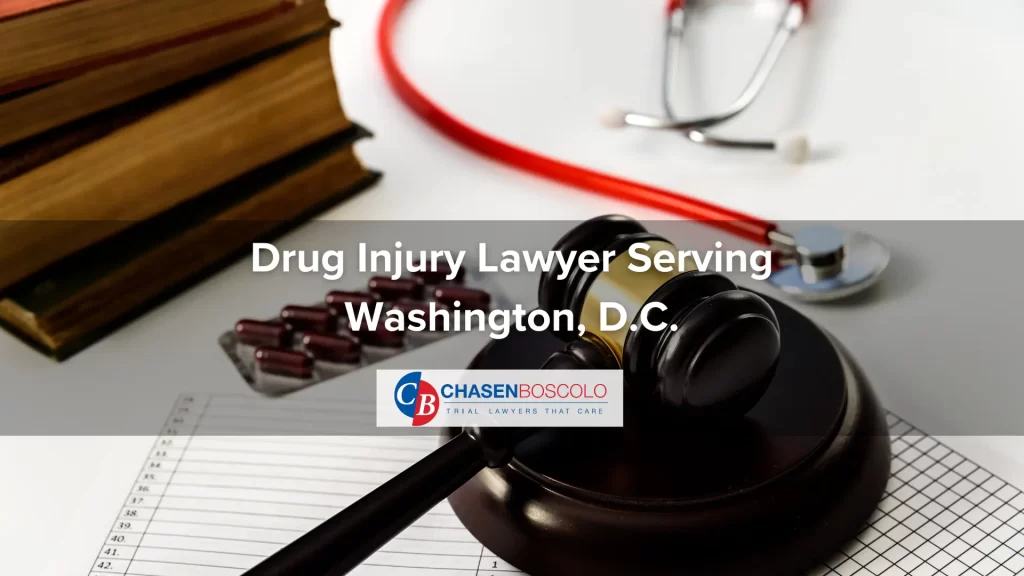
Many drugs are prescribed by physicians to cure specific ailments or alleviate symptoms from medical conditions. Doctors consider many factors when prescribing drugs because certain people can be adversely affected by certain medications.
Despite all precautions taken by medical professionals, some drugs can cause harmful side effects when they have not been thoroughly tested or defectively manufactured. A manufacturer generally needs to conduct several rounds of testing before they can even submit a new drug to the United States Food and Drug Administration (FDA) for approval.
FDA approval is not necessarily the end of a drugmaker’s responsibility for the drug. When a drugmaker becomes aware of new side effects, it still must update the warning label for the drug.
If you suffered serious injuries or your loved one was killed by a dangerous or defective drug in Washington, D.C., you do not deserve to struggle with all of the costs associated with your recovery.CHASENBOSCOLO can fight to make sure you get every single dollar of compensation you are entitled to.
Our firm has recovered more than $750 million for our clients. We can discuss your rights with you as soon as you call (301) 220-0050 or contact us online to schedule a free consultation.
Do I Need A Drug Injury Lawyer?
An attorney can conduct an independent investigation to determine the cause of your injuries. Defective and dangerous drug claims are extraordinarily complex, but a lawyer will know how to approach a case and which experts to consult.
The company that manufactured a drug has a significant amount invested in defending against claims relating to their drugs. Because the drugmaker is typically prepared to fight to get your claim thrown out, you will want a skilled and knowledgeable attorney on your side.
Another essential reason to retain legal counsel is that you could have multiple ways of pursuing your claim. While multidistrict litigation (MDL) is common in many drug cases and allows large groups of people to retain control of their cases in independent actions, class action lawsuits can also be another legal remedy for large groups of plaintiffs who then share a single award.
You deserve to know all of the options available to you, and CHASENBOSCOLO will take the time to explain them all. We are prepared to take on even the largest drugmakers.
Why Choose CHASENBOSCOLO To Handle My Case?
CHASENBOSCOLO has been serving clients for more than three decades. Our firm has a team of 25 lawyers and over 90 professionals who are available 24 hours a day, seven days a week.
Barry M. Chasen has been licensed to practice law in the District of Columbia since 1984. He is a member of the District of Columbia Bar, Prince George’s County Bar Association, and Association of Trial Lawyers of America who received the AV Preeminent rating from Martindale-Hubbell, denoting the highest level of professional excellence.
Benjamin T. Boscolo also received the AV Preeminent rating from Martindale-Hubbell as well as the Dean’s Award for Professional Responsibility from American University. He has served as a workers compensation panelist for the National Football Players Association and Major League Soccer Players Association.
You receive the No Fee Guarantee® when you work with CHASENBOSCOLO, so you pay nothing unless you receive a monetary award. We will work towards a just settlement to your case, but will not be afraid to file a lawsuit if it is necessary to get you all of the compensation you need and deserve.
Types of Drug Injury Cases We Handle
 The Center for Drug Evaluation and Research (CDER) of the FDA must evaluate new prescription and nonprescription or over-the-counter (OTC) drugs before they can be sold. While drug testing typically takes several years, expedited approval is possible through certain FDA processes.
The Center for Drug Evaluation and Research (CDER) of the FDA must evaluate new prescription and nonprescription or over-the-counter (OTC) drugs before they can be sold. While drug testing typically takes several years, expedited approval is possible through certain FDA processes.
For example, the Fast Track process is intended to get new medications to some patients quicker, the Accelerated Approval Program is designed for sooner approval of drugs for certain severe conditions, and Breakthrough Therapy allows for expedited development and review of drugs that might provide a significant improvement over current therapy. The FDA will have the goal of taking action on an application within six months when there is a Priority Review designation.
Certain drugs can affect large numbers of people in common ways, but other drug injuries can be unique. In general, common types of drug injury claims include, but are not limited to:
- Zofran® — Mothers may have been prescribed Zofran off-label during pregnancy to treat morning sickness, but the anti-nausea drug has been linked to birth defects in children.
- Abilify® Compulsive Behavior Risk — Damaging pathological behaviors such as compulsive gambling and hypersexuality have been linked to the use of the antipsychotic drug Abilify.
- Xarelto® — Some users of Xarelto® have suffered severe bleeding, strokes and blood clots. Major bleeding episodes have resulted in death.
- Diabetes Drugs Linked to Cancer — Pancreatic cancer is one of the kinds of health problems linked to certain Type 2 diabetes drugs.
- Viagra® Skin Cancer — A single use of Viagra® could be enough to double a man’s risk of developing melanoma skin cancer.
- Heartburn Drugs Linked to Kidney Disease — One class of prescription heartburn drugs used to reduce acid in a patient’s stomach, proton pump inhibitors (PPIs), have been linked to chronic kidney disease and other health risks.
- Taxotere® Permanent Hair Loss — Female breast cancer survivors have suffered permanent hair loss after using Taxotere®, an injectable concentrate administered during chemotherapy treatment for cancer.
- Invokana® and Invokamet® — Ketoacidosis is a condition in which the body produces high levels of acid in the blood and could be the result of using the Type 2 diabetes drugs Invokana and Invokamet.
- Onglyza® — In March 2016, the FDA announced that a safety review found that type 2 diabetes medicines containing saxagliptin and alogliptin could increase the risk of heart failure, particularly in patients who already have heart or kidney disease.
- Low T Heart Attacks — AndroGel® and other testosterone gels, patches and injections that are frequently marketed to men as ways to boost their sex drive, energy levels, and muscle mass can increase the risk of stroke, heart attack, and other cardiovascular injuries.
While a drugmaker is typically the defendant in most drug injury cases, it can be possible for some other parties to also be liable. A physician, for example, may be liable if they prescribed a drug to a person who had clear health concerns relating to the drug.
A pharmacy could also be liable if it made an error in its handling of the drug. It is also possible that testing laboratories or sales representatives could be liable in some circumstances.
Frequently Asked Questions (FAQs) About Drug Injuries
Below are some of the questions we get most often from clients regarding their drug injury claims. We hope this information gives you some valuable insight. If you have any questions about your particular drug injury case, please contact the experienced Maryland dangerous drug lawyers at CHASENBOSCOLO to schedule a free and confidential consultation.
What kinds of compensation could I be entitled to?
Many lawsuits against drugmakers are ultimately resolved through settlements because the insurance companies typically conclude it is cheaper to settle a case than take it to trial. Settlements are not always possible though, so some cases do go to court. A person who succeeds in proving their case could be awarded compensatory damages, which is a phrase used to describe several economic damages and noneconomic damages. Economic damages could be for the actual bills you are facing like medical expenses and lost wages while noneconomic damages are for the other kinds of harm you have suffered that are not quantifiable, like your pain and suffering or emotional distress.
What is the difference between a generic drug and a brand-name drug?
Drugs are considered brand-name when they are marketed under a proprietary, trademarked name. Most brand-name drugs have a patent life of 17 years. Generic drugs are usually far cheaper than brand-name drugs although they are identical in route of administration, quality, performance characteristics, strength, dosage, intended use, and safety. The Generic Drugs Program of the FDA conducts diligent reviews to ensure generic medicines meet the same requirements as brand-name drugs.
What is a Prescription Drug Monitoring Program?
The District of Columbia, as well as 49 states and Guam, has legislation authorizing Prescription Drug Monitoring Programs (PDMPs), which are tools utilized by government officials to reduce prescription drug abuse and diversion. The only state without a PDMP is Missouri. PDMPs collect, monitor, and analyze electronically transmitted prescribing and dispensing data submitted by pharmacies and dispensing practitioners and provided only to entities authorized by state law to access the program. Washington, D.C.’s PDMP is established under Chapter 8G of the Code of the District of Columbia. It was created through the Prescription Drug Monitoring Program Act of 2013.
Contact a Drug Injury Attorney in Washington, D.C.
As consumers, we depend on the pharmaceutical drugs that we’ve been prescribed to treat our illness and pain, and we never expect that these drugs will cause more harm or our conditions to worsen. If a defective drug has harmed you, the Washington, D.C. injury attorneys of CHASENBOSCOLO will be here to help you hold the pharmaceutical company accountable. We never charge our clients any upfront fees, and we’ll represent you on a contingency fee basis. That means that we won’t get paid unless you get paid. Contact us to discuss your case and to learn more about how we can help you by calling (301) 220-0050 today.





